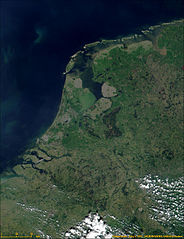Now Holland is again being compared, this time unfavorably to Belgium by no one less than economics Nobel prize winner and New York Times columnist, Paul Krugman, in a blog post titled, A Tale of Two Flat Countries.
He responds to an earlier blog post by Oxford economics professor Simon Wren-Lewis about the similarities between the UK and Holland, and says:
"The Netherlands, in particular, has the kind of Grand Bargain the Washington Post editorial page dreams of — a government of national unity committed to fiscal austerity. It’s as if Harry Reid, John Boehner, and President Obama had all agreed to implement Simpson-Bowles, with some extra front-loaded cuts thrown into the bargain too. And here’s the thing: it’s not working. So what you have is a frustrated populace, finding no “respectable” politicians willing to challenge a failing orthodoxy (i.e. my comment: austerity measures during recession)"
Krugman agrees with Wren-Lewis that it's a dangerous state of affairs if only extremist political parties (far right and far left) agree that there is a failing orthodoxy, while the established governments follow the wrong course and their citizens become frustrated and angry.
Krugman then goes on to say that in Holland, a generally well governed and serious-minded country, "the whole political center is committed to Doing The Right Thing, and in fact doing it very vigorously", but that its performance is not better than that of its southern neighbor Belgium, which for years has had a famously dysfunctional political system, where the Flemish (i.e. Dutch speaking) politicians in its North do not cooperate with their Walloon (i.e. French speaking) counterparts. In other words, it's better for the economy of a country to have a non-functioning government, than a government which consistently does the wrong things. Krugman has a point here, in the sense that doing nothing is probably better than doing the wrong things. But is his characterization of the differences between Belgium and Holland correct?
The Dutch media, Dutch (and Belgian) economists overwhelmingly disagree: in the left-leaning De Volkskrant, their economics editor Peter de Waard says in an article headlined "Will Krugman become a Belgian?" that "Krugman hasn't done any extensive research on those two countries. Krugman compares three indicators (i.e. public debt, unemployment, and the long term interest rates) and comes to his conclusion that these are not that different from each other. The Netherlands pays a lower interest rate, but its unemployment is increasing faster. "
de Waard continues by saying that Krugman ignores typical Dutch problems with its housing market and mortgages, ignores the fact that some of Belgian's political parties are more extreme than the two Dutch parties mentioned (the right wing PVV and the left wing SP), and lastly, Krugman ignores the fact that both countries, being part of the Euro-zone, are to some extent governed from Brussels by the European Union.
Dutch economist, Sweder van Wijnbergen, a former economist at the World Bank, professor of economics at the University of Amsterdam and also member of the Dutch labor party, wrote in an op-ed article in the liberal-minded NRC Handelsblad: "This is typical Krugman behavior: clear, crisp and totally wrong on the facts." van Wijnbergen reviews four indicators, GDP growth (more or less the same for both countries), unemployment (even though Dutch unemployment is rising faster, at 6% it's lower than Belgian's 8%); budget deficit as percentage of GDP (Belgium is approximately at -2.5%, and the Netherlands at - 3.5%. Both reduced this deficit from 6%, implying that Belgium has actually reduced it more than the Netherlands, just the opposite from what Krugman claims); and finally, the current account (Belgium runs a deficit; while the Netherlands runs a surplus.)
In short, van Wijnbergen states Krugman is wrong in his comparison between the two countries, but this doesn't mean that van Wijnbergen agrees with the Dutch government's economic policy (by the way, the same Dutch labor party, of which van Wijnbergen is a member, is part of this government coalition and the Dutch finance minister is also a member of the labor party. So, sometimes things are complicated in economics.) van Wijnbergen finds Dutch policy inconsistent and not tackling the critical issue of unemployment, and its causes of structural impediments and lack of banking reform.
There are many more comments on Krugman's blog post, but I haven't been able to find a supportive one. This all shows that Krugman has succeeded in becoming a very influential and wide-read columnist even outside of the U.S., but apparently not someone many economists agree with, especially when dealing with the tale of the two low countries.
I think Krugman has made a serious mistake in this blog post by saying too much about areas he doesn't know intimately, but on the other hand it still appears to me that austerity where applied (see large parts of the Euro-zone and also the U.S.) has not had any beneficial effects. Maybe it's a matter of time, but just have a look at the video clip of Paul Krugman in debate with two UK conservatives (Jon Moulton, a venture capitalist and Andrea Leadsom, Conservative MP) on BBC's Newsnight: what the latter two say doesn't sound that credible to me, and the UK's economy seems to be crumbling slowly even under a Conservative government.

No comments:
Post a Comment